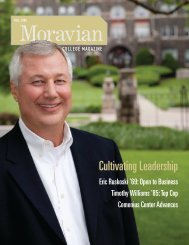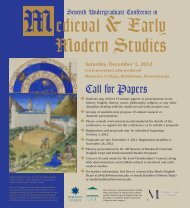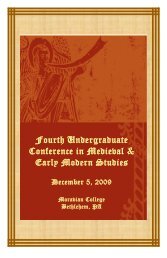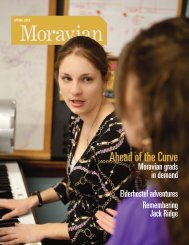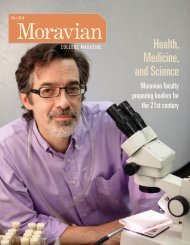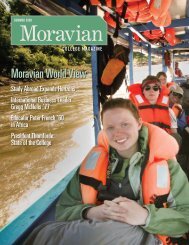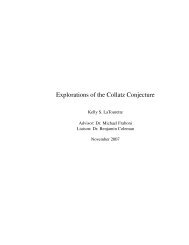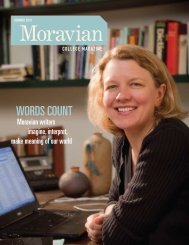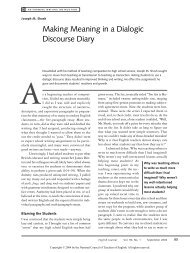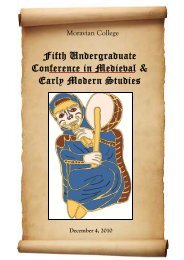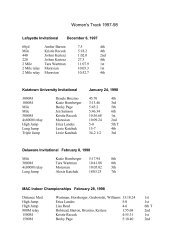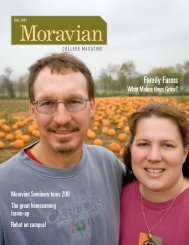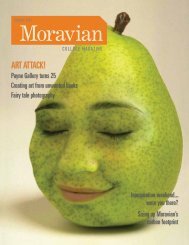Big Man on Campus - Moravian College
Big Man on Campus - Moravian College
Big Man on Campus - Moravian College
You also want an ePaper? Increase the reach of your titles
YUMPU automatically turns print PDFs into web optimized ePapers that Google loves.
A View from the Top<br />
Basketball<br />
Dynasty<br />
Chris Thomforde’s undergraduate experience at<br />
Princet<strong>on</strong> University included a stellar career<br />
<strong>on</strong> the varsity basketball team. Bill Bradley,<br />
Princet<strong>on</strong> class of ’65, helped basketball coach<br />
Willem Van Breda Kolff persuade him to come<br />
to Princet<strong>on</strong>. He was featured <strong>on</strong> the cover of<br />
the February 27, 1967, issue of Sports Illustrated<br />
with teammate Gary Walters (class of ’67, and<br />
now director of athletics at Princet<strong>on</strong>) as a<br />
sophomore, captained the team as a senior,<br />
and, like Bradley, was drafted by the New York<br />
Knickerbockers for a professi<strong>on</strong>al career in<br />
basketball (which lasted <strong>on</strong>ly through a two-<br />
week training camp in 1974) after graduati<strong>on</strong>.<br />
Although he found the ministry and academe<br />
more rewarding than a professi<strong>on</strong>al sports<br />
career, athletic endeavor remains a significant<br />
influence <strong>on</strong> his outlook.<br />
You use sports metaphors to express many<br />
things, and sports evidently provided a great<br />
learning experience for you that carries over<br />
into your life now. How does <strong>Moravian</strong>’s<br />
Divisi<strong>on</strong> III athletics program fit into its liberal<br />
educati<strong>on</strong> and purpose?<br />
I think w<strong>on</strong>derfully. The<br />
idea of Divisi<strong>on</strong> III is that<br />
athletics should be part of<br />
the learning experience that<br />
students have. So it’s not<br />
that a student learns calcu-<br />
lus or Greek or biology over<br />
here and then plays football<br />
over there. Paul Moyer, our<br />
athletics director, is good at<br />
asking: what learning takes<br />
place <strong>on</strong> those fields? Or in<br />
James draKe/sports illustrated<br />
those locker rooms, or <strong>on</strong> those buses, or during<br />
a game? What have I learned about dealing<br />
with pain, or dealing with the judgments of other<br />
people, or getting al<strong>on</strong>g with people I d<strong>on</strong>’t like,<br />
or dealing with success? Those are the things<br />
that can be learned there, that can’t be learned<br />
in a chemistry lab or history class.<br />
You cite the value of liberal arts colleges<br />
in general. How would you say <strong>Moravian</strong> is<br />
different from other places? What makes<br />
it special?<br />
Every school of which I’ve ever been<br />
a part, either as a student or as a teacher,<br />
chaplain, administrator, has had some<br />
sense of community. But I think the Mora-<br />
vian religious traditi<strong>on</strong> informs the value<br />
of community here. Probably not explicitly.<br />
But the <strong>Moravian</strong>s, the religious group,<br />
had a noti<strong>on</strong> that the truth is discovered<br />
in community. Much of scholarship, as you<br />
know, can be kind of a solitary, isolated kind<br />
of endeavor. I’ve been impressed, just in a<br />
couple of m<strong>on</strong>ths, to find that community<br />
is very important here, that we discover the<br />
truth in community, and we live out our lives<br />
together in community.<br />
I was just reading Zinzendorf, who’s<br />
quite clear that the interpretati<strong>on</strong> of the gos-<br />
pel <strong>on</strong>ly takes place in community. It’s not<br />
ex cathedra, in which a bishop says this is<br />
what this passage means, and you all believe<br />
it. That value is intersected by a realiza-<br />
ti<strong>on</strong> that is occurring in many small liberal<br />
arts colleges, driven by the complexity in<br />
scientific discovery, that the understanding<br />
of the world is not really departmental any<br />
more, but that you need interdepartmental,<br />
interdisciplinary work. I think the<br />
days of having a major in <strong>on</strong>e area<br />
and thinking that that was enough<br />
probably d<strong>on</strong>’t exist any more. So<br />
you have the sciences, in particu-<br />
lar, seeing that the world is quite<br />
complex, and you need a number of<br />
disciplines in order to understand<br />
the world. And this is aided by this<br />
piece out of our religious traditi<strong>on</strong>.<br />
I think that can be very fruitful<br />
here.<br />
I also sense a balance here<br />
between the liberal arts—how do<br />
you think broadly, how do you articulate<br />
complex ideas and paradoxes cogently, how<br />
do you become familiar with your own great<br />
traditi<strong>on</strong>s as well as other people’s—and<br />
a healthy kind of pre-professi<strong>on</strong>al train-<br />
ing. We’re not a school to train bankers, or<br />
to train doctors, but if you’re going to be<br />
a banker or a doctor, this would be a good<br />
place to come to get some of the skills that<br />
are necessary to do that, balanced with the<br />
sort of broad thinking, creative expressi<strong>on</strong>,<br />
careful articulati<strong>on</strong> that comes al<strong>on</strong>g with<br />
the liberal arts. And our artistic traditi<strong>on</strong>,<br />
our very important attenti<strong>on</strong> to music and<br />
art, also provides a balance between aesthet-<br />
ics and technique.<br />
The other piece, as compared to other<br />
schools I’ve been at, is that we’re in the<br />
middle of a city with the rusty remains of<br />
the Industrial Revoluti<strong>on</strong>. The city poses the<br />
educati<strong>on</strong>al questi<strong>on</strong>: what kind of future<br />
are we building for our students in the new<br />
technological era that’s coming up, when all<br />
our instituti<strong>on</strong>s—health, government, educa-<br />
ti<strong>on</strong>, religi<strong>on</strong>—were shaped by the industrial<br />
era that, at least in North America and Eu-<br />
rope, is essentially over. The blast furnaces<br />
are large m<strong>on</strong>uments to something that was,<br />
and they are reminders that <strong>Moravian</strong> has an<br />
opportunity to help think about what comes<br />
next, and what will be required of us as hu-<br />
man beings both professi<strong>on</strong>ally and pers<strong>on</strong>-<br />
ally in this new order that’s coming.<br />
What pers<strong>on</strong>al values and traits are<br />
most important for the president of a col-<br />
lege like <strong>Moravian</strong>?<br />
One quality that’s very important is clear-<br />
headedness: to be able to think clearly about<br />
issues that are complex. I think another<br />
virtue you might have to have is an apprecia-<br />
ti<strong>on</strong> for people. Because these are small com-<br />
munities, the motivati<strong>on</strong>s of the people who<br />
are here are other than power and success<br />
or capital accumulati<strong>on</strong>. So you have to be<br />
sensitive to their motivati<strong>on</strong>s, and know how<br />
to appreciate them, and support and sustain<br />
them. And then I think there would have to be<br />
a love for the things of the mind. Running a<br />
college is different from running a business,<br />
because our business is thinking, learning,<br />
and performing, and if you d<strong>on</strong>’t love those<br />
things, and d<strong>on</strong>’t enjoy reading, or you d<strong>on</strong>’t<br />
enjoy listening to music or watching a good<br />
football game, you’re going to be fundamen-<br />
tally out of step with the primary functi<strong>on</strong><br />
of the place. And then you need a pretty good<br />
work ethic, because there’s a lot to do, and it<br />
never stops.<br />
Where do you intend to focus your ef-<br />
forts as president? What’s your number-<br />
><br />
<strong>on</strong>e short-term goal, and what are the<br />
l<strong>on</strong>ger-term goals?<br />
My number-<strong>on</strong>e short-term goal is simply<br />
to learn about this community. In any com-<br />
munity there are espoused values or rhythms<br />
that you can see <strong>on</strong> the surface of things, and<br />
they’re good or bad as the case might be, but<br />
they’re obvious, and you should take them<br />
seriously. Then there are also operati<strong>on</strong>al<br />
values, and you w<strong>on</strong>’t learn about those<br />
until you’ve gotten into some kind of crisis,<br />
because then you really see how people be-<br />
have or what they really think is important.<br />
So I think number <strong>on</strong>e is to get to learn who<br />
we are and what we are all about. There are<br />
many good things in place here, so I d<strong>on</strong>’t<br />
have to come and invent everything.<br />
Next would be to do some strategic<br />
thinking. We have good people, we’re in a<br />
good city, we have a good heritage, and we’re<br />
doing many things well. What would it mean<br />
for <strong>Moravian</strong> to grow and become better or<br />
more mature? We’ve g<strong>on</strong>e through a period<br />
of enrollment growth and financial growth,<br />
so maybe in some ways we’re like teenagers,<br />
in that regard. Things are growing, and we’re<br />
getting used to the size of our feet and hands<br />
and body. But you d<strong>on</strong>’t just keep growing<br />
infinitely. You reach some sort of point of<br />
physical growth, and that stops, and then you<br />
have to become more mature in other ways.<br />
You’ve said that <strong>Moravian</strong> is <strong>on</strong> the move.<br />
Where is it going, and what are the chal-<br />
lenges and what are the scary parts?<br />
One of the destinati<strong>on</strong>s I would like to<br />
arrive at is to become an “exemplary” institu-<br />
ti<strong>on</strong>. You d<strong>on</strong>’t have to be big or famous to<br />
become exemplary. I’d like <strong>Moravian</strong> to come<br />
to mind if somebody were to ask, “where is a<br />
really good art department,” or “what schools<br />
with seminaries also have really good nurs-<br />
ing programs,” or any of a number of other<br />
questi<strong>on</strong>s. If we were known am<strong>on</strong>gst our<br />
compani<strong>on</strong>s, peers, and aspirant group as re-<br />
ally knowing how to do things well: that’s the<br />
sort of destinati<strong>on</strong> I would rather get to than<br />
being number 25 or 62 or 198 or number 1.<br />
I think that the risky part for us will be<br />
two things, and they are manageable, but<br />
risks. One is <strong>on</strong> the revenue side: how do<br />
we increase revenue so that the school can<br />
c<strong>on</strong>tinue to run, and even increase revenue a<br />
lot, so that it can be enriched, without rais-<br />
ing tuiti<strong>on</strong> exorbitantly, so that we would<br />
eliminate our historical market. For me,<br />
that would be, how do we really make the<br />
endowment grow, how can we make the an-<br />
nual fund grow. The sec<strong>on</strong>d big issue is how<br />
we keep access open to capable students<br />
regardless of their ability to pay. Especially<br />
in the forties and fifties, we were recognized<br />
as a place where the s<strong>on</strong> or daughter of a<br />
steelworker, or a high school teacher, or a<br />
postman could come and get a really good<br />
educati<strong>on</strong> and end up being a doctor or a<br />
teacher. So that’s sort of our calling, or voca-<br />
ti<strong>on</strong>, you might say, but with the change in<br />
demography—more and more new immi-<br />
grant groups coming into the country—how<br />
do we have enough revenue to make sure<br />
that people can come to <strong>Moravian</strong> who are<br />
intellectually able but maybe not financially<br />
able. So I think creating revenue and keeping<br />
the door open to people of ability are our<br />
two big challenges going forward.<br />
What do you see as the role of a liberal<br />
arts instituti<strong>on</strong> today? And in the future?<br />
A liberal-arts educati<strong>on</strong> is absolutely<br />
essential for men and women going forward,<br />
for this reas<strong>on</strong>: at its best a liberal arts edu-<br />
cati<strong>on</strong> should enable some<strong>on</strong>e to distinguish<br />
between things, think clearly about certain<br />
matters, and gain a kind of moral agency,<br />
having sorted and having thought through<br />
a decisi<strong>on</strong>, and taking acti<strong>on</strong> for the sake<br />
of the comm<strong>on</strong> good. I think historically<br />
the liberal arts have fostered those kinds of<br />
thinking, discerning, and acting <strong>on</strong> behalf of<br />
14 MORAVIAN COLLEGE MAGAZINE WINTER 2007 WINTER 2007 MORAVIAN COLLEGE MAGAZINE 15<br />
photo by John Kish iV<br />
everybody.<br />
In our time and going forward we have<br />
this huge explosi<strong>on</strong> of access to informa-<br />
ti<strong>on</strong>. But how do you know which piece of<br />
informati<strong>on</strong> is authentic, or which is helpful,<br />
or what relati<strong>on</strong>ship exists between this bit<br />
of informati<strong>on</strong> and that bit of informati<strong>on</strong>?<br />
A liberal arts educati<strong>on</strong> helps you not <strong>on</strong>ly<br />
discern differences, but also make c<strong>on</strong>nec-<br />
ti<strong>on</strong>s. And to distinguish between the good<br />
and the bad, and to prefer the good, and<br />
have the courage to act up<strong>on</strong> what you think<br />
is authentic. W



